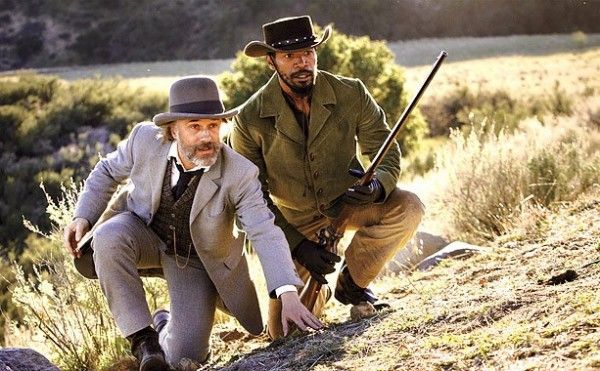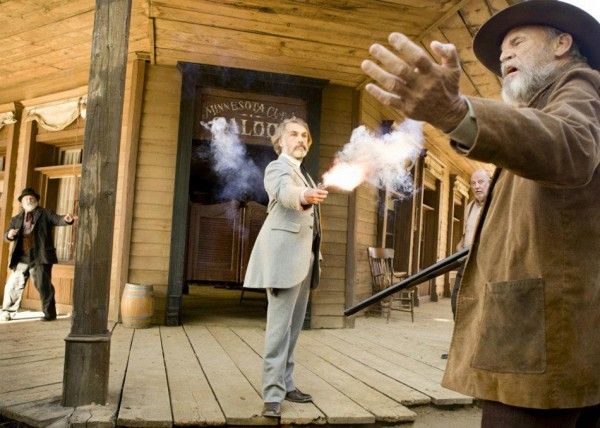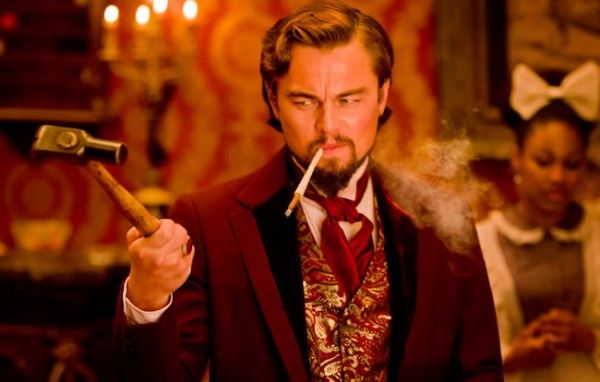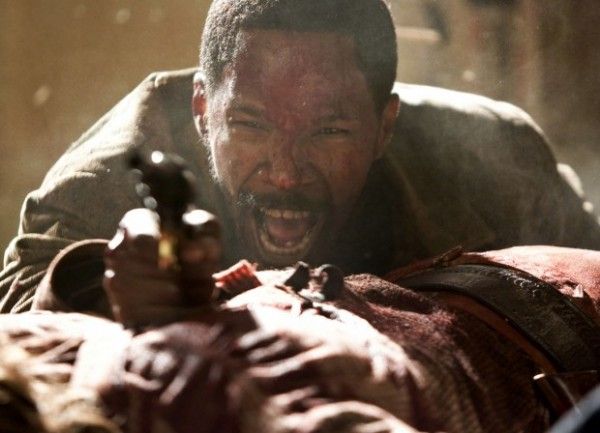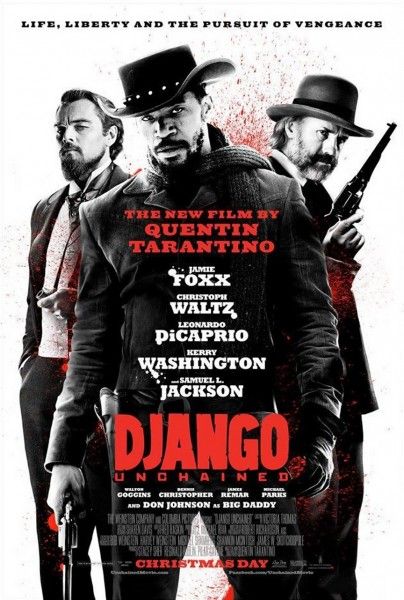When people speak of America's great history, there should be an asterisk involved. This is a great country with a rich history, but it's a history that also involves genocide of Native Americans and the enslavement of Africans. But we considered it civilized, and no country wants to recognize its barbaric behavior (even Barbarians probably thought they weren't so bad). In the classic western, we see American West mythologized with heroes and villains. In the spaghetti western, we see how a foreign country (Italy) reexamined the values of our westerns. In his new film, Django Unchained, writer-director Quentin Tarantino takes the western to the American South of 1858, and reconsiders the civility of our "great history." At turns painfully hilarious and explosively violent, Django Unchained doesn't have the narrative tightness of Tarantino's previous features, but it retains all of the thoughtfulness and style the filmmaker has become known for.
Django (Jamie Foxx) is a slave on a chain gang, but he's freed from his captors by the eccentric bounty hunter, Dr. King Schultz (Christoph Waltz). Schultz frees Django on the condition that Django help Schultz find the Brittle Brothers since Schultz doesn't know what they look like. Afterwards, Schultz pledges to train Django in the ways of bounty hunting, help him track down his wife Broomhilda (Kerry Washington), and free her from the despicable plantation owner Calvin Candie (Leonardo DiCaprio).
The relatively simple premise expands into an epic feature not because of its twists and turns, but because of its digressions to show how Django goes from being a faceless slave to a man with an increasingly violent disposition that is held at bay only by his love for Broomhilda. He's a man walking around a hateful world that doesn't realize how hateful it is. The very notion of seeing a "nigger on a horse" is absolutely appalling to townsfolks, but it bewilders Schultz since he's not an American. Together, the two have to confront the bizarre notions of justice in an inherently unjust world.
Tarantino, naturally, handles these situations with verbose, hilarious dialogue, and violence that makes it look like Sonny Corleone got off light. The chatty side goes to Schultz, who believes he can kill as he pleases as long as he has the proper documentation. To him, "flesh is flesh", and while Schultz finds slavery abhorrent, he sees himself in a similar trade except the bodies he delivers are dead. As the film moves along, Schultz learns that not all flesh is created equal, but it's not a body's mortality that defines its worth.
What makes Django Unchained a worthwhile experience is that the movie isn't simply saying, "Slavery is bad," as if no one realized that. Instead, it asks, "Why did no one think slavery was bad?" How does a culture evolve to where a man can have two black people fight to the death for his entertainment? And it's not as if Candie's "mandingo" fights are unbelievable. They're gladiatorial combat. Candie can speak about a Southern tradition, but slavery is a tradition that has spanned centuries and civilizations.
This notion of "civilization" is what makes Django Unchained so fascinating. Throughout the movie, we see and hear references to civility, but never in a heavy-handed way. It's in the little touches of characters' behavior, and more importantly, the behaviors of society. In addition to providing proper documentation for his murders, Schultz stresses the importance of not wearing a hat indoors. For all of his fancy trappings, Candie is nothing more than a wealthy, well-spoken brute. At most, his heavy handed, Tarantino lets the camera linger on a marble statue of Roman wrestling.
As usual, Tarantino buries his subtext in a stylish whirlwind of comedy and violence. The cast delivers with Waltz being the standout. Schultz is almost the flipside of Waltz's previous Tarantino character, Hans Landa. Both men are happy to kill for their own ends, but Schultz has an inner warmth and playfulness whereas Landa wore those traits as a mask to hide his sadism. If anything, Landa has more in common with Calvin Candie, although DiCaprio seems to be aiming at the scenery-chewing performance of Brad Pitt's Lt. Aldo Raine. DiCaprio never seems to completely give himself over to the character's eccentricities, and the restraint slightly diminishes his performance. As for Foxx, he slightly fades into the background when standing next to Waltz, but the pairing works since neither is trying to one-up the other, and Foxx is the one with a more complex character arc.
Surrounding these characters are Tarantino's signature flourishes: the catchy and bombastic soundtrack, the dynamic cinematography, the esoteric nods to the genre, etc. The only missing ingredient is the tightness of the editing, and this can likely be attributed to the loss of Tarantino's longtime editor, Sally Menke. Menke died in 2010, and her absence is greatly felt in Django Unchained. The movie isn't horribly edited as much as it feels like a half-step behind where it should be.
Aside from the editing problems, Django Unchained is the kind of film we've come to expect from Tarantino. The commentary is sharp and insightful without being overbearing, the comedy is irreverent (one sequence could have been taken right out of Blazing Saddles), and the action is blood-soaked. We may like to remember a noble history that never existed, but if we're going to rewrite history, we may as well blow it to hell. We were halfway there already.
Rating: A-


